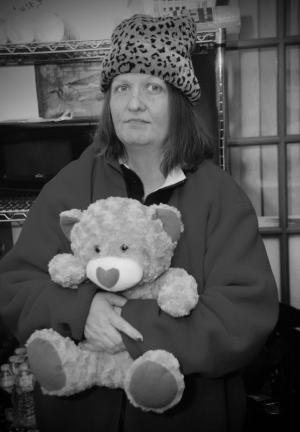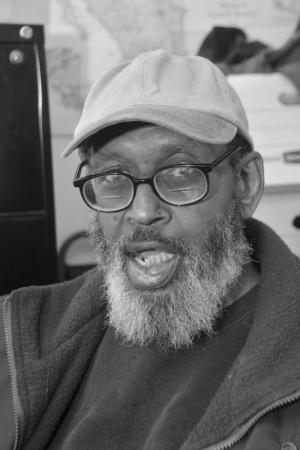Living on the edge of society
Without any income and a history of incarceration, Brian Francisco has been fighting an uphill battle for years. He has no permanent place to live so he spends his days at the ACE Peer Resource Center and nights at St. Luke's Episcopal Parish House in Seaford, a Code Purple shelter.
On six days each week, the center closes at 4 p.m. and the shelter opens at 7 p.m., leaving a three-hour gap. On Sunday, the ACE Center is closed.
“There is nothing to do,” he says. “I walk around and sometimes go to stores to get out of the cold.”
He's not alone. Several clients are in the same situation this winter, including Robin Robbins, 53, who found herself roofless this past summer after her house near Seaford went to foreclosure. Prior to that, she was a center volunteer.
Living roofless is more harsh than living homeless, says Jim Martin, center director. He said people in this situation have a temporary place to stay for a few hours, but they are also forced to live outdoors. “Many of these people are literally invisible, living off the grid,” he said.
And when the Code Purple shelter shuts down in spring, they are forced to find out-of-the-way places to camp, Martin said.
“Their No. 1 problem is where to go at night,” he said. “Their No. 2 problem is where to go during the day. We've solved that second problem for them. We can be a launching pad.”
Martin said all humans deserve a place to sleep at night. “We tend to support animal rescue, but what about people rescue?” he asked. He said a year-round homeless shelter is desperately needed.
Martin said the center provides basic services to people who have no other place to turn. “People ask me what would happen if the center was not here. I tell them some people would die. It's that dramatic,” he said.
Her life takes a dramatic turn
“You never know. You can be up one day and down the next,” Robbins said.
She says her faith keeps her going. “I was battling depression, but I didn't turn to drugs or alcohol. God has always been there when time are tough,” she said.
She has serious health issues and finds it hard to walk, but that doesn't deter her from walking to the Code Purple shelter in Seaford each night for a hot meal. After dinner, women are transported to the women's shelter at Gateway Fellowship in Bridgeville. They are then transported back to the ACE Center the following morning.
Martin said she qualifies for Social Security disability, but it's a long wait and a lot of red tape before that goal is achieved. “Women in their 50s really do fall through the cracks. Mothers with children are a priority,” Martin said.
Robbins' story is similar to others at the center. Her husband left her seven years ago; a boyfriend ended up stealing her truck and money she received from a lawsuit after falling at work at a local medical facility. “My income went to zero,” she said.
She was also trying to provide a home for her daughter and grandchildren. “Our church was helping us, but we were so poor we resorted to burning the furniture for heat,” she said.
When state officials learned about their situation, the children were taken and placed in foster care. Eventually, her daughter got a job, and her children were returned to her.
“I've been trying to rise up for six years,” she said. She focused on finding a job and a place to live.
Martin said the center provides a safe place for her and other clients for eight hours each day. “Then they step out into a daily hurricane,” he said.
Martin said the opening of ACE Center II in Georgetown could occur as early as the first week in February to assist those in need in the center of the county.
Incarceration contributes to lifestyle
Growing up in the Wilmington area, Francisco spent 12 years at the James T. Vaughn Correctional Center in Smyrna. For a variety of reasons, he did not graduate from high school and does not have his GED. “Because of that, his options are limited to working at a chicken plant or having his own business,” said Martin.
Spending his formative years behind bars, Francisco, 50, didn't have a chance to learn life skills most take for granted.
Francisco spent two years in solitary confinement and used the time to write a 302-page book by hand in capital letters. “It needs editing but I have found someone who will publish it for me,” he said. The book, titled “Beyond Reason,” is based on his life.
On Level 2 probation, he also has a history of violations that land him back in the correctional system.
“It's a vicious cycle for him,” Martin said. “Whenever he gets a little bit ahead, he ends up back in prison and loses everything again, and he has to start over from scratch.”
Any contact with police can create a violation, Martin said.
Francisco worked for several months on the night shift at Mountaire near Millsboro, riding his bike 15 miles each day. “Riding in winter at night was just too much,” he said.
He does odd jobs when he can and has some experience working construction.
Martin said Francisco also suffers from anxiety. “I'm trying to stay healthy without medication because of the terrible side effects,” Francisco said.
By chance, Francisco and Martin met at Georgetown Presbyterian Church. “Someone in Wilmington gave me his name, and I came to Sussex County to get a fresh start,” he said.
Now, he spends his days at the center and nights at the Code Purple shelter.
Martin said the center is helping Francisco get into the Supplemental Nutrition Assistance Program and a phone, and he's applied for jobs. “We are working to get him to be the best version of himself,” Martin said.
“I just need someone to give me a chance,” Francisco said.
Finding a path to sobriety
Blair Molock, 62, ended up at the ACE Center within a few hours of being released from the Vaughn Correctional Center where he served 14 months for assaulting his brother. Molock, an Army veteran who worked in the Philadelphia area, has not only battled serious mental illness issues, but is an alcoholic.
While he is still in flux, Martin considers Molock's situation one of the center's success stories.
He had nowhere to turn because he could not live at his family home because of a restraining order. He faced homelessness on his release from prison.
Sober now for 14 months, if he slips back to his old habits, he faces seven years in prison, Martin said. “He now has a lot of motivation to stay sober,” he said.
Martin said Molock was released from prison on Jan. 14 in his prison clothes without a winter coat or transportation. Thanks to staff at the ACE Center, he has found a place to rent with another recovering alcoholic. “By themselves they would fail but together they can get it done,” Martin said.
Not able to drive, he had to report to his probation officer in Georgetown within 72 hours of his release. Once again, the ACE Center came to his aid and was able to provide transportation.
“The state should be able to slice off a little money to provide clothing and some gate money when people are coming out of prison. Now they are left to their own devices, which can easily lead back to prison,” Martin said.
While technically not homeless, Martin said, Molock is one the center's clients who is just one step away from finding themselves out in the cold.





























































